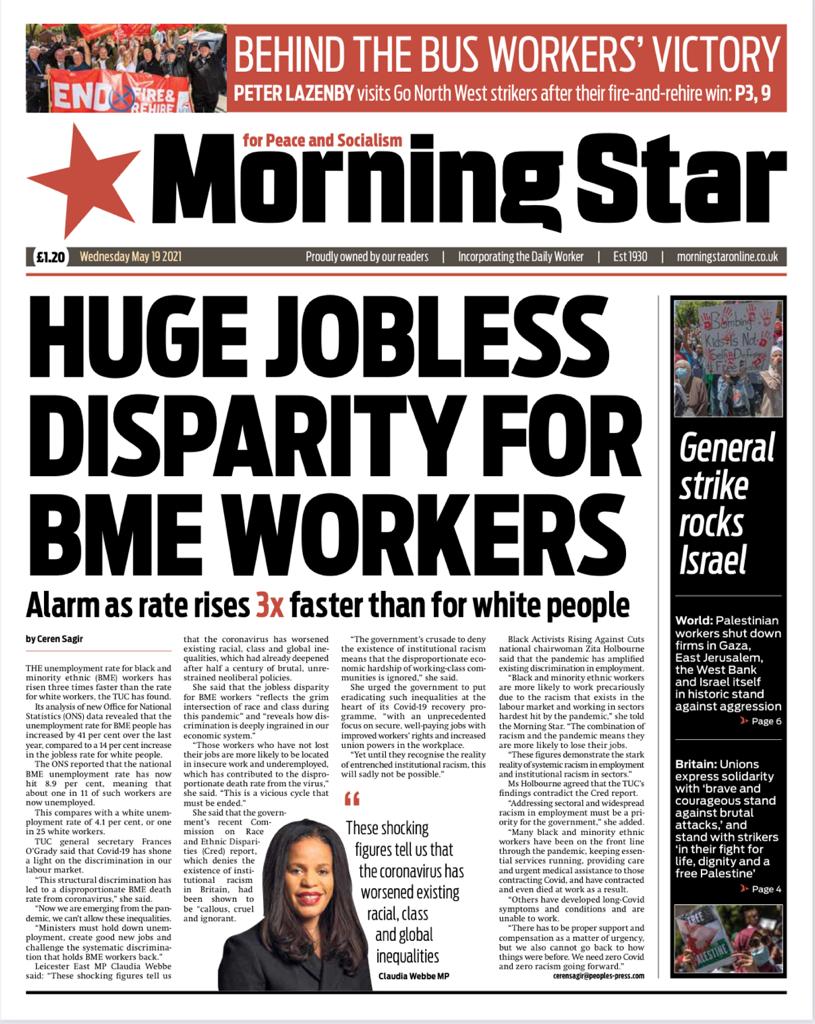
Huge jobless disparity for BME Workers
Alarm as rate rises 3x faster than for white people
THE unemployment rate for black and minority ethnic (BME) workers has risen three times faster than the rate for white workers, the TUC has found.
Its analysis of new Office for National Statistics (ONS) data revealed that the unemployment rate for BME people has increased by 41 per cent over the last year, compared to a 14 per cent increase in the jobless rate for white people.
The ONS reported that the national BME unemployment rate has now hit 8.9 per cent, meaning that about one in 11 of such workers are now unemployed.
This compares with a white unemployment rate of 4.1 per cent, or one in 25 white workers.
TUC general secretary Frances O’Grady said that Covid-19 has shone a light on the discrimination in our labour market.
“This structural discrimination has led to a disproportionate BME death rate from coronavirus,” she said.
“Now we are emerging from the pandemic, we can’t allow these inequalities.
“Ministers must hold down unemployment, create good new jobs and challenge the systematic discrimination that holds BME workers back.”
Leicester East MP Claudia Webbe said: “These shocking figures tell us that the coronavirus has worsened existing racial, class and global inequalities, which had already deepened after half a century of brutal, unrestrained neoliberal policies.
She said that the jobless disparity for BME workers “reflects the grim intersection of race and class during this pandemic” and “reveals how discrimination is deeply ingrained in our economic system.”
“Those workers who have not lost their jobs are more likely to be located in insecure work and underemployed, which has contributed to the disproportionate death rate from the virus,” she said. “This is a vicious cycle that must be ended.”
She said that the government’s recent Commission on Race and Ethnic Disparities (Cred) report, which denies the existence of institutional racism in Britain, had been shown to be “callous, cruel and ignorant.
“The government’s crusade to deny the existence of institutional racism means that the disproportionate economic hardship of working-class communities is ignored,” she said.
She urged the government to put eradicating such inequalities at the heart of its Covid-19 recovery programme, “with an unprecedented focus on secure, well-paying jobs with improved workers’ rights and increased union powers in the workplace.
“Yet until they recognise the reality of entrenched institutional racism, this will sadly not be possible.”
Black Activists Rising Against Cuts national chairwoman Zita Holbourne said that the pandemic has amplified existing discrimination in employment.
“Black and minority ethnic workers are more likely to work precariously due to the racism that exists in the labour market and working in sectors hardest hit by the pandemic,” she told the Morning Star. “The combination of racism and the pandemic means they are more likely to lose their jobs.
“These figures demonstrate the stark reality of systemic racism in employment and institutional racism in sectors.”
Ms Holbourne agreed that the TUC’s findings contradict the Cred report.
“Addressing sectoral and widespread racism in employment must be a priority for the government,” she added.
“Many black and minority ethnic workers have been on the front line through the pandemic, keeping essential services running, providing care and urgent medical assistance to those contracting Covid, and have contracted and even died at work as a result.
“Others have developed long-Covid symptoms and conditions and are unable to work.
“There has to be proper support and compensation as a matter of urgency, but we also cannot go back to how things were before.
“We need zero Covid and zero racism going forward.”
Claudia Webbe MP is the member of Parliament for Leicester East. You can follow her at www.facebook.com/claudiaforLE and twitter.com/ClaudiaWebbe

